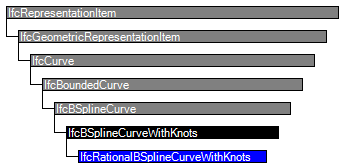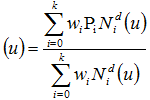Natural language names
 | Rationale Bézier-Spline - Kurve mit Kontrollpunkten |
 | Rational BSpline Curve With Knots |
 | Courbes Bsplines rationnelles avec nœuds |
Change log
| Item | SPF | XML | Change | Description | IFC2x3 to IFC4 4.0.0.0 |
|---|---|---|---|---|
| IfcRationalBSplineCurveWithKnots | ADDED | IFC4 Addendum 1 4.0.1.0 | ||
| IfcRationalBSplineCurveWithKnots | ||||
| Degree | MODIFIED | Type changed from INTEGER to IfcInteger. | ||
| ClosedCurve | MODIFIED | Type changed from LOGICAL to IfcLogical. | ||
| SelfIntersect | MODIFIED | Type changed from LOGICAL to IfcLogical. | ||
| KnotMultiplicities | MODIFIED | Type changed from INTEGER to IfcInteger. | ||
| WeightsData | MODIFIED | Type changed from REAL to IfcReal. | IFC4x2 Candidate 4.2.0.0 | |
| IfcRationalBSplineCurveWithKnots | ||||
| PositioningElement | ADDED | IFC4x2 to IFC4x3_RC1 | ||
| IfcRationalBSplineCurveWithKnots | ||||
| PositioningElement | MODIFIED | Aggregation changed from NONE to SET. | IFC4x3_RC2 to IFC4x3_RC3 | |
| IfcRationalBSplineCurveWithKnots | ||||
| PositioningElement | DELETED |
Semantic definitions at the entity
Entity definition
A rational B-spline curve with knots is a B-spline curve described in terms of control points and basic functions. It describes weights in addition to the control points defined at the supertype IfcBSplineCurve.
All weights shall be positive and the curve is given by:
where
| k+1 | number of control points |
| Pi | control points |
| wi | weights |
| d | degree |
NOTE Entity adapted from rational_b_spline_curve in ISO 10303-42.
HISTORY New entity in IFC4.
Attribute definitions
| # | Attribute | Type | Cardinality | Description | G |
|---|---|---|---|---|---|
| 9 | WeightsData | IfcReal | L[2:?] | The supplied values of the weights. | X |
| Weights :=IfcListToArray(WeightsData,0,SELF\IfcBSplineCurve.UpperIndexOnControlPoints) | IfcReal | A[0:UpperIndexOnControlPoints] | The array of weights associated with the control points. This is derived from the weights data. | X |
Formal Propositions
| Rule | Description |
|---|---|
| SameNumOfWeightsAndPoints | There shall be the same number of weights as control points. |
| WeightsGreaterZero | All the weights shall have values greater than 0.0. |
Inherited definitions from supertypes
Entity inheritance

Attribute inheritance
| # | Attribute | Type | Cardinality | Description | G |
|---|---|---|---|---|---|
| IfcRepresentationItem | |||||
| LayerAssignment | IfcPresentationLayerAssignment @AssignedItems | S[0:1] | Assignment of the representation item to a single or multiple layer(s). The LayerAssignments can override a LayerAssignments of the IfcRepresentation it is used within the list of Items.
IFC2x3 CHANGE The inverse attribute LayerAssignments has been added. IFC4 CHANGE The inverse attribute LayerAssignment has been restricted to max 1. Upward compatibility for file based exchange is guaranteed. | X | |
| StyledByItem | IfcStyledItem @Item | S[0:1] | Reference to the IfcStyledItem that provides presentation information to the representation, e.g. a curve style, including colour and thickness to a geometric curve.
IFC2x3 CHANGE The inverse attribute StyledByItem has been added. | X | |
| IfcGeometricRepresentationItem | |||||
| IfcCurve | |||||
| Dim :=IfcCurveDim(SELF) | IfcDimensionCount | The space dimensionality of this abstract class, defined differently for all subtypes, i.e. for IfcLine, IfcConic and IfcBoundedCurve. | X | ||
| IfcBoundedCurve | |||||
| IfcBSplineCurve | |||||
| 1 | Degree | IfcInteger | The algebraic degree of the basis functions. | X | |
| 2 | ControlPointsList | IfcCartesianPoint | L[2:?] | The list of control points for the curve. | X |
| 3 | CurveForm | IfcBSplineCurveForm | Used to identify particular types of curve; it is for information only. | X | |
| 4 | ClosedCurve | IfcLogical | Indication of whether the curve is closed; it is for information only. | X | |
| 5 | SelfIntersect | IfcLogical | Indication whether the curve self-intersects or not; it is for information only. | X | |
| UpperIndexOnControlPoints :=(SIZEOF(ControlPointsList) - 1) | IfcInteger | The upper index on the array of control points; the lower index is 0. This value is derived from the control points list. | X | ||
| ControlPoints :=IfcListToArray(ControlPointsList,0,UpperIndexOnControlPoints) | IfcCartesianPoint | A[0:UpperIndexOnControlPoints] | The array of control points used to define the geometry of the curve. This is derived from the list of control points. | X | |
| IfcBSplineCurveWithKnots | |||||
| 6 | KnotMultiplicities | IfcInteger | L[2:?] | The multiplicities of the knots. This list defines the number of times each knot in the knots list is to be repeated in constructing the knot array. | X |
| 7 | Knots | IfcParameterValue | L[2:?] | The list of distinct knots used to define the B-spline basis functions. | X |
| 8 | KnotSpec | IfcKnotType | The description of the knot type. This is for information only. | X | |
| UpperIndexOnKnots :=SIZEOF(Knots) | IfcInteger | The upper index on the knot arrays; the lower index is 1. | X | ||
| IfcRationalBSplineCurveWithKnots | |||||
| 9 | WeightsData | IfcReal | L[2:?] | The supplied values of the weights. | X |
| Weights :=IfcListToArray(WeightsData,0,SELF\IfcBSplineCurve.UpperIndexOnControlPoints) | IfcReal | A[0:UpperIndexOnControlPoints] | The array of weights associated with the control points. This is derived from the weights data. | X | |
Formal representations
XML Specification
<xs:element name="IfcRationalBSplineCurveWithKnots" type="ifc:IfcRationalBSplineCurveWithKnots" substitutionGroup="ifc:IfcBSplineCurveWithKnots" nillable="true"/>
<xs:complexType name="IfcRationalBSplineCurveWithKnots">
<xs:complexContent>
<xs:extension base="ifc:IfcBSplineCurveWithKnots">
<xs:attribute name="WeightsData" use="optional">
<xs:simpleType>
<xs:restriction>
<xs:simpleType>
<xs:list itemType="ifc:IfcReal"/>
</xs:simpleType>
<xs:minLength value="2"/>
</xs:restriction>
</xs:simpleType>
</xs:attribute>
</xs:extension>
</xs:complexContent>
</xs:complexType>
EXPRESS Specification
ENTITY IfcRationalBSplineCurveWithKnots
SUBTYPE OF (IfcBSplineCurveWithKnots);
WeightsData : LIST [2:?] OF IfcReal;
DERIVE
Weights : ARRAY [0:UpperIndexOnControlPoints] OF IfcReal := IfcListToArray(WeightsData,0,SELF\IfcBSplineCurve.UpperIndexOnControlPoints);
WHERE
SameNumOfWeightsAndPoints : SIZEOF(WeightsData) = SIZEOF(SELF\IfcBSplineCurve.ControlPointsList);
WeightsGreaterZero : IfcCurveWeightsPositive(SELF);
END_ENTITY;


 EXPRESS-G diagram
EXPRESS-G diagram Link to this page
Link to this page